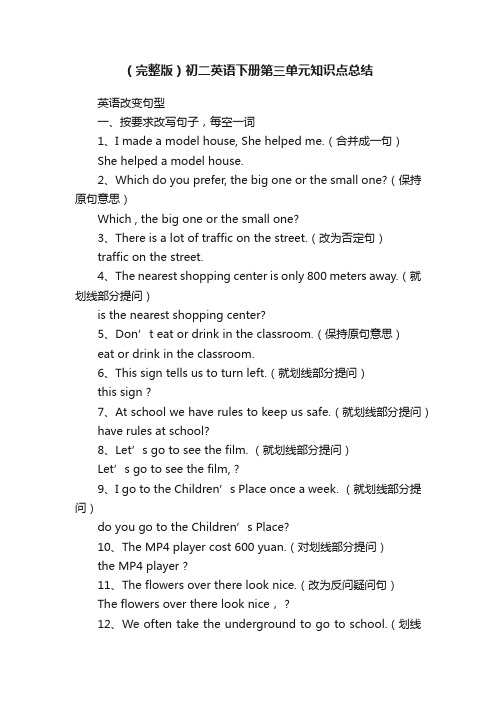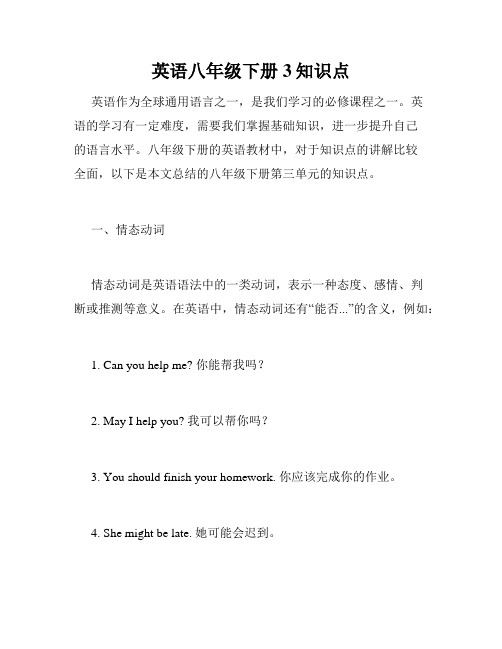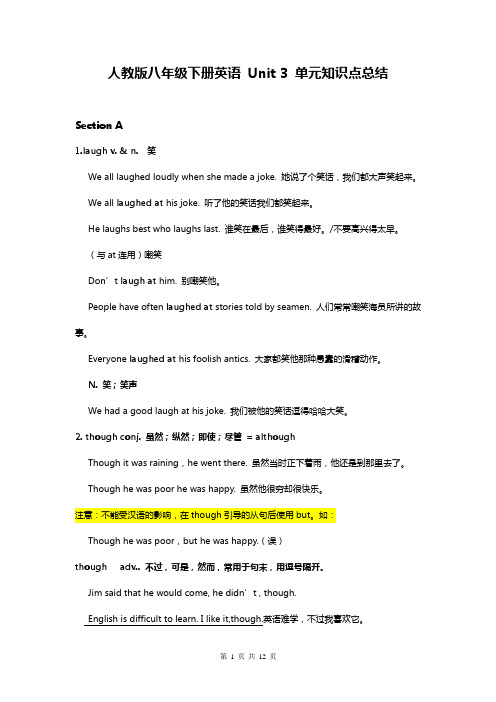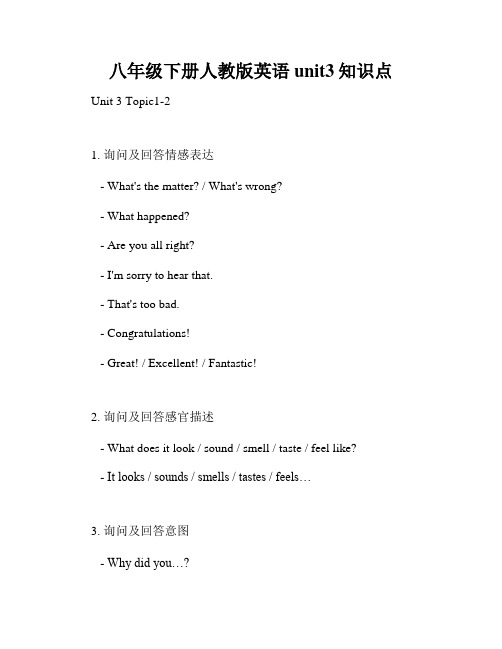八年级英语下册第三单元知识点
(完整版)八年级英语下册Unit3知识点总结Couldyoupleasecleanyourroom

Unit3 Could you please clean your room?Peter ,could you please take out the trash?彼得,你能把垃圾倒了吗?Could you please do sth ?请你(做)......好吗?用于提出恳求,希望获得对方的必定回答,说话的语气比较客气委宛。
Could不是can的过去式,是委宛、礼貌的说法。
回答用can.【常用答语】必定回答:Sure./ Of course./ Certainly./No problem.否认回答:Sorry , I can’t2、 take out取出(v+ adv)【注】 : 跟代词做宾语,代词放中间;跟名词做宾语,可放在中间,也可放在后边His teeth hurt badly. The dentist take them out .【短语】 take out the trash倒垃圾take a walk take back回收take place发生take off 3. Can you do the dishes.?那你能够洗盘子吗?do the dishes洗碗漫步脱下;take away腾飞拿走,取走【构造 1 】 do the + 名词:do the dishes/ laundry洗餐具/衣服【构造 2 】 do the + 动词 -ing do the cleaning打扫卫生【构造 3 】 do one ’ s +名词do one ’ s housework/ homework做家务/家庭作业【构造 4 】 do some + 动词 -ing do some reading/ shopping读写书/购物Could I at least finish watching this show?起码让我看完这个节目能够吗?1】 Could I do a sth?我能够做......吗?用于表达恳求,语气比较委宛。
(完整版)初二英语下册第三单元知识点总结

(完整版)初二英语下册第三单元知识点总结英语改变句型一、按要求改写句子,每空一词1、I made a model house, She helped me.(合并成一句)She helped a model house.2、Which do you prefer, the big one or the small one?(保持原句意思)Which , the big one or the small one?3、There is a lot of traffic on the street.(改为否定句)traffic on the street.4、The nearest shopping center is only 800 meters away.(就划线部分提问)is the nearest shopping center?5、Don’t eat or drink in the classroom.(保持原句意思)eat or drink in the classroom.6、This sign tells us to turn left.(就划线部分提问)this sign ?7、At school we have rules to keep us safe.(就划线部分提问)have rules at school?8、Let’s go to see the film. (就划线部分提问)Let’s go to see the film, ?9、I go to the Children’s Place once a week. (就划线部分提问)do you go to the Children’s Place?10、The MP4 player cost 600 yuan.(对划线部分提问)the MP4 player ?11、The flowers over there look nice.(改为反问疑问句)The flowers over there look nice, ?12、We often take the underground to go to school.(划线提问)you often go to school?13、Do you live in the city? Do you live in the countryside?(合并成一句)Do you live the city the countryside?14、We are going to see a film this Monday.(就划线部分提问)going this Monday?15、If you want to stay healthy, you should go to bed early. (保持原句意思) Go to bed earlyHealthy.16、Of all the sports I like football best. (保持原句意思)is sport.17、Sam does a lot of homework every evening. (改为否定句)Sam homework every evening.18、Your father has been to Hongkong. (改为反问疑问句)Your father has been to Hongkong , ?19、These hot dogs cost eleven yuan. (就划线部分提问)do these hot dogs ?20、I’m selling American food. (就划线部分提问)are you selling?21、My father is a good cook. (保持原句意思)My father cooking.22、I think she is right. (改为否定句)I think she is .23、His father never goes to work late. (改为反问疑问句)His father never goes to work late, ?24、We shall have some fruit.(改为一般疑问句)we fruit?25、I’d like a piece of pizza. (改为一般疑问句)a piece of pizza?26、Jack may need to buy some chicken wings. (就划线部分提问)Jack to buy?27、There’s much milk in the glass. (改为否定句)milk in the glass.28、This is my watch. (保持原句意思)watch is .29、I need to interview Mr. Wang for my project. (就划线部分提问)you to interview for your project?30、We freeze the meat because it will be fresh for a long time. (就划线部分提问) you the meat?31、It’s twenty minutes’ walk from my home to our school. (就划线部分提问)from your home to your school ?32、Let’s take a picture in front of the building. (改为反问疑问句)Let’s take a picture in front of the building , .33、How do you like the book“Harry Potter”? (保持原句意思)the book“Harry Potter”?34、I liked oranges better than apples. (保持原句意思)I oranges apples.35、I like watching sports news best. (就划线部分提问)of TV programme like best?36、Tom has read some fables in the holidays. (改为否定句)Tom fables in the holidays.37、He left Shanghai the day before yesterday.(改为现在完成时)He from Shanghai two days.38、I’m leaving for New York this coming Wednesday. (就划线部分提问)leaving New York?39、His father never goes to work late. (改为反问疑问句)His father never goes to work late,?40、We have two English lessons on Friday morning. (改为否定句)We English lessons on Friday morning.41、Are you ready for the coming test? (保持原句意思)the coming test?42、I’m going on a trip to B eijing with my parents in the summer holidays. (就划线部分提问)going on a trip to Beijingin the summer holidays?43、The man is good at singing. (保持原句意思)The man singing.44、He can hardly believe that maglev runs so fast. (改为反问疑问句)He can hardly believe that maglev runs so fast, ?45、He doesn’t like winter. Neither does his sister.(合并成一句)he his sister likes winter.用所给单词的适当形式填空Don’t make so much_________(noisy)! My father is writing.Some_____________(Australia) like to camp in the coutryside at weekend. It’s v ery _________(relax) to listen to de songs.It’s very________(pleased) to meet you.City life is very _________(difference) form the country life.We must not ride bicycles here. It’s a ________(warn) sign.Why don’t we go _______(camp) this weekend?It is a _______(use) information for me,I think.A:What does this sign ______(meaning)?B:We mustn’t eat or drink here.10、Can you make your life more____________?(enjoy)11、I like living in the suburbs. It’s quiet and _______.(peace)12、People have their own way of _________.(relex)13、My uncle Jack likes _______in the suburbs.(live)14、My computer is ___________.It doesn't work now.(break)15、He used to __________when he was young.(smoking)16、Do you read newspaper _________?(regular)17、The film called “Computer War” is veay ________.(excited)18、Don’t fall ________ in class,Sam.(sleep)19、Let’s buy some food and ________ for the party.(drink)20、If you use your own head, maybe you will make_______mistakes.(few)21、Children, __________ l want to show you a wonderful picture.(first)22、Shanghai is an _________city,isn’t it?(national)23、Mrs Brown likes to take care of _______cats and dogs.(home)24、I felt very _______after the hard work.(tire)25、________, I am going to read several books during the holiday. (second)26、________,I am going to have a trip with my friends during the festival.(third)27、We had a _______ birthday party for my brother at bother at home last Sunday.(surprised)28、What ______ it is to have the party!(fun)29、Jack was very ________ with the birthday present. (prease)30、David is a friandly man , _________in the town knows him.(every)31、I look forword to _________ the film.(see)32、She got the _________fish form the shop. (freeze)33、Please stir the _______ with a spoon.(mix)34、My father owns a big _________boat. He is a fisherman.(fish)35、Let’s study the ________lesson now. (four)36、If you want to stay healthy, you should exercise__________.(regular)37、We are going to go on an _________ this weekend.(out)38、If you want to be __________,you must eat less junk food.(healthy)39、How many__________ dogs and cats are there in the town?(home)40、Children should not often eat _________food.(freeze)41、There is a ___________ sign on the wall.(direct)42、__________, you must finish it yourself. (second)43、I have a beach hut and I like_________ there.(relax)44、Is there any ________food in the fridge? (freeze)45、The weather is usually ________ here in April. (pleasure)46、We must not leave rubbish. It’s a _________ sign. (warn)47、He nodded his head in __________ ,then walked home. (silent)48、We must stop here. It’s a _________sign. (instruct)49、It’s a good habit to do morning exercise __________. (regular)50、This book is very _________ to me. (help)新目标八年级英语第三单元I. 应掌握的词组:1. babysit one’s sister 照顾妹妹2. visit one’s grandmother 看望奶奶3. spend time with friends和朋友们一起度过时光4. visit cousins 看望表弟等5. Go to sports camp 去运动野营6.go to the beach 去海滩7. go camping 去野营8. Go shopping 去买东西9. go swimming 去游泳10. go boating去划船11. go skating 去溜冰12. go walking去散步13. go climbing 去登山14. go dancing去跳舞15. go hiking 去徒步远足16. go sightseeing 去观光17. go house-hunting 去找房子18.go on a hike 徒步旅行,go bike riding 骑自行车旅行,go fishing 去钓鱼19. do some shopping 买东西20. do some washing 洗衣服21. do some cooking 作饭22. do some reading 读书23. do some speaking训练口语24. do some sewing 做缝纫活25.that sounds nice 那好极了26. at home 在家27. how about=what about ……怎么样?28. how long 多长时间29. how far 多远30. how often 多长时间一次31. how much, how many 多少32. have a good time =have fun= have a wonderful time= enjoy oneself玩得高兴,过得愉快33. show sb. Sth.=show sth. to sb.出示某物给某人看give me the book=give the book to me 给我书,pass me the cup=pass the cup to me 把杯子递给我,sell me the house=sell the house to me 把房子卖给我buy me a book =buy a book for me 给我买书,make me a cake=make a cake for me给我做蛋糕44. Ask her about her plans 向她询问她的计划ask sb. about sth.向某人询问某事45. forget to do sth. 忘记要做某事,forget doing sth. 忘记做过某事II. 应该掌握的句子:1.What are you doing for vacation? I’m babysitting my sister.假期你要做什么?我要照顾我的妹妹。
英语八年级下册第三单元知识点总结

Unit 3. Could you please clean your room?一、短语动词1、take out 带出去;取出;拔出;除掉动副词组代词作宾语时必须放在两词之间。
2、come over 固定短语过来,顺便来访,拜访。
后面加介词to,后接表示地点的名词作宾语。
拓展:take out of 把---从---取出/带出3、hang →hung→hung hang out 闲逛;溜达。
4、throw down扔下;随手丢下其中throw可用作及物或不及物动词,意为扔,掷→threw→thrown拓展:throw at向----扔去(带有攻击性)throw to 扔给---(不含恶意)throw away扔掉SectionB1、take care of 照顾;照料。
相当于look after后可接名词、(反身)代词作宾语。
Take good care of相当于look after well2、二、动词用法1、finish 及物动词完成后跟名词、代词或动词ing形式作宾语。
拓展:与finish一样用法的动词或动词短语有:enjoy/look forward to/mind/have fun/practice/be busy/consider/feel like/give up2、pass用作及物动词给;递;pass sb sth =pass sth to sb把某物递给某人。
走过、通过(考试等)作不及物动词,(时间)过去,流逝3、borrow sth from sb向某人借某物。
非延续性动词Lend(lent;lent) sb sth=lend sth to sb借给某人某物。
非延续性动词Keep 由“保存”引申为“借”,延续性动词,可与时间段连用。
四川-----Excuse me,can I_____your pen?-----sorry,I have_____it to Bob.A.borrow;lendB.borrow;borrowedC.lend;borrowedD.lend;lent4、hate及物动词厌恶;讨厌,表示一种感情或心理状态,不能用于进行时态。
八年级英语下册第三单元笔记

八年级英语下册第三单元笔记一、重点单词。
1. rubbish.- n. 垃圾;废弃物。
例如:There is a lot of rubbish on the street.(街道上有很多垃圾。
)2. fold.- v. 折叠;对折。
如:Fold the paper in half.(把纸对折。
)3. sweep.- v. (swept, swept) 扫;打扫。
例如:I sweep the floor every day.(我每天扫地。
)4. floor.- n. 地板;地面。
如:The book is on the floor.(书在地板上。
)5. mess.- n. 杂乱;不整洁。
例如:What a mess!(多么杂乱啊!)6. throw.- v. (threw, thrown) 扔;掷。
例如:Don't throw rubbish everywhere.(不要到处扔垃圾。
)7. neither.- adv. 也不。
用于否定句中,表示前面所说的情况也适用于后者。
例如:He doesn't like apples, neither do I.(他不喜欢苹果,我也不喜欢。
)- pron. 两者都不。
例如:Neither of them is right.(他们两个都不对。
)8. shirt.- n. 衬衫。
如:This is a white shirt.(这是一件白色的衬衫。
)9. pass.- v. 给;递;走过;通过。
例如:Pass me the salt, please.(请递给我盐。
);He passed the exam.(他通过了考试。
)10. borrow.- v. 借;借用。
例如:Can I borrow your pen?(我能借用你的钢笔吗?)11. lend.- v. (lent, lent) 借给;借出。
例如:I can lend you some money.(我可以借给你一些钱。
八年级英语下册第三单元知识点

八年级英语(Yu)下册第三单元知识点一(Yi)、重点短(Duan)语1.go out for dinner2.stay out late3.go to the movies4.get a ride5.work on sth.6.finish doing sth.7.clean and tidy8.do the dishes9.take out the rubbish10.fold your/the clothes11.sweep the floor12.make your/the bed13.clean the living room14.No problem15.16.17.throw down18.throw away19.(to+地(Di)点)20.take sb. for a walk21.all the time22.all day/evening23.do housework24.shout back 大声(Sheng)回应25.walk away26.share the housework27.28.(do sth.) in surprise 惊讶(Ya)地(做(Zuo)…)29.get something to drink30.watch one show31.hang out32.pass sb. sth.33.lend sb. sth.34.get sth. wet35.hate + (to do/ doing) sth.36.do chores37.help sb.(to)do /with sth38.bring a tent39.buy some snacks40.go to the store41.invite sb. to a party42.make sb. do sth.43.enough stress44.waste of time45.in order to为(Wei)了46.get good grades47.mind doing sth.48.depend on49.develop children 's independence50.look after/take care of51.do one’ s part in (doing ) sth.做某人分(Fen)内的事二(Er)、重点句(Ju)型1. Could you please clean your room? ( Could you please + do sth.?)2. I have to do some work.(Could +主(Zhu)语+ do sth. ?表(Biao)情求)4. She won’ t be happy if she sees t his mess.5. For one week, she did not do any housework and neither did I. (Neither +be动(Dong)词/助动(Dong)词/情态动词+主语.)6. My mom came over as soon as I sat down in front of the TV.7. It’s the parents’ job.(it为形式主语,to do不定式是真正的主语,并且后置)8. I think it’s important for children to learn how to do chores and help their parents with housework.9. The earlier kids learn to be independent, the better it is for their future. (the+比较级…,the+比较级…句型)三、单元考点2.take out带出去;取出,拿出 take the rubbish out take out 100yuan take your tickets out3. make the/ one’s bed整理床铺,make the table收拾桌子,摆放碗筷5. (at) any minute (now)很快,马上Mother will be back any minute now.Hurry up! The train is leaving at any minute.6. mess 【名词】不整洁,杂乱(不堪) be in a mess乱七八糟,杂乱不堪0. reply回答,回复【不及物动词】reply to sb./sth. ,reply to your letter reply in writing13. pass sb. sth.= pass sth. to sb.把某物递给/传给某人,请把盐递给我。
八下英语第三单元知识梳理

八下英语第三单元知识梳理一、单元核心知识点概述八下英语第三单元主要以日常交流为主题,涉及日常生活中的一些场景,如学校、家庭、购物等。
本单元的重点内容包括日常用语、词汇、短语和语法结构等。
通过本单元的学习,学生将能够更好地应对日常生活中的英语交流,提高口语表达能力。
二、重点词汇与短语1.新词汇:例如,recognize(认出),conversation(对话),pronunciation(发音)等。
2.实用短语:如,What"s the matter?(什么事?),How do you spell it?(怎么拼写?),Could you repeat that please?(请再说一遍?)等。
三、语法解析本单元的语法重点是现在进行时和一般现在时的用法。
现在进行时用于表示现在正在进行的动作,如:I"m listening to music.(我正在听音乐。
)一般现在时用于描述经常发生的动作或事实,如:She studies English everyday.(她每天都学习英语。
)四、实用对话与句型1.对话:例如,A: What"s your favorite color? B: My favorite color is blue.2.句型:如,How do you spell "champion"?(“冠军”怎么拼写?),I have a headache.(我头疼。
)五、练习与测试建议1.针对词汇和短语,可以通过制作单词卡片、和朋友一起练习口语等方式进行巩固。
2.对于语法知识,可以通过编写句子、翻译句子等方式进行练习。
3.本单元的实用对话和句型可以在日常生活中尝试使用,提高自己的英语实际应用能力。
总之,八下英语第三单元的学习重点在于日常英语交流能力的提升。
通过掌握本单元的核心知识点,学生们将能够在日常生活和学习中更加自信地运用英语。
英语八年级下册unit3知识点

英语八年级下册unit3知识点英语八年级下册Unit3主要是涉及到旅游及热门景点相关内容。
在这一单元中,我们学习了许多关于出行的单词和词组,同时也学习了旅游方面的文化知识。
下面,本文将围绕这些知识点,总结归纳出本单元的核心知识点。
第一部分:旅游方面的单词和词组1. sightseeing:观光2. destination:目的地3. travel,journey:旅行4. tour:游览5. accommodation:住宿6. transportation:交通7. ticket:票8. guide:导游9. excursion:短途旅游我们应该注意这些单词的正确发音和用法,使自己的英语更加准确清晰。
第二部分:旅游方面的文化知识1. 美食文化:在旅游中品尝当地的美食也是很重要的一部分。
比如在中国,烤鸭和火锅就是很受外国人欢迎的美食。
在日本,则是寿司和生鱼片。
2. 交通文化:在不同国家,交通方式也是各不相同的。
比如在欧洲,大多数人选择步行或骑行,而在中国城市,公共交通比较发达,人们通常乘坐地铁、公交车等。
3. 饮食礼仪:在不同国家,饮食礼仪也是有所不同的。
比如在中国,用餐时要招待客人,避免用筷子顶餐盘等等礼仪问题。
在日本,则更注重吃饭时的细节和仪式感。
第三部分:热门景点在这个单元中我们还学习了关于热门景点的话题。
下面介绍一些世界著名热门景点。
1. 埃菲尔铁塔:法国巴黎的标志性建筑。
2. 自由女神像:位于美国纽约港口,是法国人向美国人赠送的礼物。
3. 金门大桥:连接美国旧金山和马林县,是世界上最著名的桥梁之一。
4. 罗马斗兽场:意大利罗马的古代竞技场,是世界历史上最著名的文化遗产之一。
5. 万里长城:中国的镇国之宝,是目前世界上保存最完好、规模最宏大的古代筑墙工程。
总结:英语八年级下册Unit3,主要涉及旅游方面的单词和词组、旅游方面的文化知识和世界著名热门景点。
我们可以通过学习这些知识点,提高我们的英语交流能力,也可以更好地了解和欣赏不同国家的风土人情。
英语八年级下册3知识点

英语八年级下册3知识点英语作为全球通用语言之一,是我们学习的必修课程之一。
英语的学习有一定难度,需要我们掌握基础知识,进一步提升自己的语言水平。
八年级下册的英语教材中,对于知识点的讲解比较全面,以下是本文总结的八年级下册第三单元的知识点。
一、情态动词情态动词是英语语法中的一类动词,表示一种态度、感情、判断或推测等意义。
在英语中,情态动词还有“能否...”的含义,例如:1. Can you help me? 你能帮我吗?2. May I help you? 我可以帮你吗?3. You should finish your homework. 你应该完成你的作业。
4. She might be late. 她可能会迟到。
5. They must be tired. 他们一定很累了。
情态动词在句子中通常位于行为动词之前,否定情态动词要放在行为动词之后。
需要注意的是,有些情态动词的用法是需要特别记忆的,例如“had better”和“used to”等。
二、动词的时态时态是英语语法中的重要概念之一,与汉语大体相同,英语也有过去、现在、未来三种时态。
在八年级下册的英语教材中,我们主要学习了以下几种时态:1. 一般现在时一般现在时表示现在的状态或动作,例如:I play football every day. 我每天都踢足球。
2. 一般过去时一般过去时表示过去的状态或动作,例如:I watched TV last night. 昨晚我看了电视。
3. 现在进行时现在进行时表示现在正在进行或正在发生的动作,例如:She is writing a letter. 她正在写信。
4. 过去进行时过去进行时表示过去某个时刻正在发生的动作,例如:I was sleeping when he called me. 当他打电话给我时,我正在睡觉。
5. 将来进行时将来进行时表示将来某个时刻正在进行或正在发生的动作,例如:I will be eating dinner at 7 o'clock tomorrow. 明天晚上7点我正在吃晚饭。
人教版八年级下册英语第三单元知识点

人教版八年级下册英语第三单元知识点Unit 3 Could you please clean your room?一、重点短语1.go out for dinner出去吃饭2.stay out late在外面待到很晚3.go to the movies去看电影4.geta ride搭车5.work on从事6.cleanand tidy干净洁7.do the dishes洗餐具8.takeout the rubbish倒垃圾9.fold your/the clothes叠衣服10.sweepthe floor扫地11.make your/the bed整理床铺12.cleanthe living room打扫客厅13.no problem没问题14.welcomesb.欢迎某人e home fro m school/work放学/下班回家16.throw down扔下17.sit down坐下eover过来19.take sb.for a walk带某人去散步20.all the time总是21.all day/evening整日/夜22.dohousework做家务23.shout back大声回应24.walkaway走开25.a comfortable home一个舒适的家26.share the housework分担家务27.get some thing to drink拿点喝的东西28.insurprise惊讶地29.watch one show观看节目30.hangout闲逛31.pass sb.sth.把某物传给某人32.lend sb.sth.把某物借给某人33.get sth.wet使某物弄湿34.hate to do sth.讨厌做某事35.help sb.to do/with sth帮助某人干某事36.do chores做杂务37.bring a tent带顶帐篷来38.buy some snacks买些小吃39.invite sb to a party邀请某人参加聚会40.go to the store去商店41.make sb.do sth使某人做某事42.enough stress足够的压力43.a waste of time浪费时间44.inorder to为了45.get goodgrades取得好成绩46.minddoing sth.介意做某事47.developchildren’s independence发展孩子的独立性48.dependon依赖49.do ones part in(doing)sth.做某人分内的事50.look after/take care of 照顾;51.finish doing sth.完成做某事二、知识点解析1.“Could you please do sth.?”的答语以下两种情况:接受请求时可以用Yes,sure./Sure./Of course./Certainly./No problem./My pleasure./It’s my pleasure./With pleasure.等来回答拒绝请求时可以用Sorry./Sorry,I can’t.等来回答,还可以用Ihave to do sth.来解释其否定句是:“Could youplease not do sth.?”2.有关“家务劳动”有关的短语:takeout the rubbish/trash倒垃圾foldone’s clothes叠衣服sweepthe floor扫地cleanthe room打扫房间makeone’s/the bed铺床dothe dishes/wash the dishes洗餐具3.throw down扔下throwat扔向,掷向throw away扔掉例题:Recycling is good,so don’t__________bottles or newspapers.A.find outB.hand ine upD.throw away4.the minute表示“一…….就……”,相当于as soon as.(引导时间状语从句)e.g.:I’ll tell himthe minute he gets there.5.常见time的短语:all the time一直,总是at times不时,有时in time及时on time按时forthe first time第一次in no time立刻at any time随时bythe time到...的时候atthe same同时have a good/great/wonderful time玩的愉快例题:---Hurry up.It’s almost time for school.---Don’t worry.We are sure to be atschool__________.A.at timesB.on timeC.all the timeD.by the time6.as….as表示“和……一样”,之间要用形容词或副词的原级。
人教版八年级下册英语 Unit 3 单元知识点总结(含练习题及答案)

人教版八年级下册英语Unit 3 单元知识点总结Section Augh v. & n. 笑We all laughed loudly when she made a joke. 她说了个笑话,我们都大声笑起来。
We all laughed at his joke. 听了他的笑话我们都笑起来。
He laughs best who laughs last. 谁笑在最后,谁笑得最好。
/不要高兴得太早。
(与at连用)嘲笑Don’t laugh at him. 别嘲笑他。
People have often laughed at stories told by seamen. 人们常常嘲笑海员所讲的故事。
Everyone laughed at his foolish antics. 大家都笑他那种愚蠢的滑稽动作。
N. 笑;笑声We had a good laugh at his joke. 我们被他的笑话逗得哈哈大笑。
2. though conj. 虽然;纵然;即使;尽管= althoughThough it was raining,he went there. 虽然当时正下着雨,他还是到那里去了。
Though he was poor he was happy. 虽然他很穷却很快乐。
注意:不能受汉语的影响,在though引导的从句后使用but。
如:Though he was poor,but he was happy.(误)though adv.. 不过,可是,然而,常用于句末,用逗号隔开。
Jim said that he would come, he didn’t , though.English is difficult to learn. I like it,though.英语难学,不过我喜欢它。
3. quietly轻声地,安静地,平静地quiet轻声的,安静的,平静的The students walked to a quiet place.同学们向一个安静的地方走去。
八年级英语下册第三单元知识点

八年级英语下册第三单元知识点八年级英语下册第三单元知识点:重要词组及短语1.couldyoupleasedosth.?你能……吗?/请你干……好吗?2.dothechores做杂务3.dothedishes洗餐具4.sweepthefloor清扫地板5.takeoutthetrash倒垃圾6.makeone'sbed铺床7.foldone'sclothes叠衣服8.cleanthelivingroom清扫客厅9.stayoutlate晚归eover过来11.haveatest考试12.getaride搭车eone'scomputer使用某人的电脑14.hatesth./hatetodosth./hatedoingsth.讨厌某事/做某事liketodo(doing)sth.15.dothelaundry=dosomewashing=washclothes洗衣服16.makebreakfast/makedinner=dosomecooking做饭17.washthecar刷车18.workon从事,忙于workat学习、致力于、在……上下工夫19.borrowsomemoney借一些钱borrowsth.fromsb.向某人借某物(借入)lendsb.sth.=lendsth.tosb.借给某人某物(借出) Youcanborrowsomemoneyfromyourbrother.你可以向你哥哥借些钱。
Canyoulendmeyourbike?你能借给我你的自行车吗?20.invitesb.todosth.邀请某人做某事Theyinvitedmetojointheirclub.他们邀请我参加俱乐部。
invitesbtoaplaceinviteyoutomyparty21.gotothestore去商店22.agreesb.todosth.同意某人做某事agreewithsb.同意某人的意见disagreesb.todosth.不同意某人做某事disagreewithsb.不同意某人的意见23.takecareof=lookafter照顾、照看、照料takegoodcareof=lookafter…well把……照管得好26.takesb.forawalk带某人去散步27.playwithsb.和某人玩28.forgettodosth.忘记去做某事(未做) forgetdoingsth.忘记做过某事(做过)(1)do,make短语归类dothedishes洗餐具domyhomework做我的家庭作业dochores做家务,处理琐事dothelaundry洗衣dotheshopping购物dosomereading读书makeyourbed铺床makebreakfast做早餐makedinner做晚饭maketea泡茶,沏茶makeacupofcoffee冲一杯咖啡(2)关于to的短语总结:havetodosth.不得不,必须做某事needtodosth.需要做某事hatetodosth.讨厌做某事liketodosth.喜欢做某事wanttodosth.想做某事lovetodosth.热爱做某事forgettodosth.忘记做某事starttodosth.开始做某事begintodosth.开始做某事asksbtodosth.请某人做某事八年级英语下册第三单元知识点:重点句型1.Couldyoupleasecleanyourroom?Yes,sure./Sorry,Ican't.Ihavetodomyhomeworkfirst.2.CouldIpleaseusethecar?Sure./Certainly./Ofcourse./No,youcan't.Ihavetogoout.在表示请求帮助或请求允许的疑问句中,常用could代替can,以表示礼貌,委婉或不确定的语气,而can则不具备这些语气。
八年级下册英语第三单元知识点

八年级下册英语第三单元知识点八年级下册的英语第三单元是我们学习英语之旅中的重要一站。
在这个单元里,我们将学习一些重要的语法和词汇知识,以及提高我们的听说读写能力。
下面,我们来一起回顾一下这个单元的知识点。
一、名词的复数形式在英语中,名词的复数形式是非常重要的。
通常,我们可以通过在名词后面加上“-s”来表示复数形式,如books、cats等。
但是也有一些特殊情况,如以“-s”、“-sh”、“-ch”、“-x”或“-o”结尾的名词,复数形式是在名词后面加上“-es”,如boxes、watches、bushes、foxes和tomatoes 等。
二、动词的一般现在时和一般过去时在第三单元里,我们学习了动词的一般现在时和一般过去时的用法。
一般现在时用来表示经常性的动作或现在的状态,我们可以在动词原形后面加上“-s”或“-es”来构成一般现在时,如plays、goes等。
一般过去时用来表示过去发生的事情,我们可以在动词原形后面加上“-ed”或变化其结尾的字母形式来构成一般过去时,如played、went等。
三、形容词的比较级和最高级形容词的比较级和最高级是用来比较不同事物之间的属性或状态的。
通常,我们可以在形容词原形后面加上“-er”来构成比较级,如bigger、happier等。
而构成最高级,我们可以在形容词原形后面加上“-est”,如biggest、happiest等。
但是也有一些特殊形式,如good、bad和far等,它们的比较级和最高级分别是better、worse和farther/further。
四、名词所有格名词所有格表示某物属于某人或某事物的所有关系。
通常,我们可以在名词后面加上“-’s”来表示名词所有格,如John’s book。
如果名词是以“-s”结尾的复数形式,我们只需要在名词后面加上一个撇号“’”来表示名词所有格,如the students’ books。
五、句子的倒装结构在某些情况下,句子的主语和谓语动词的位置可以交换,这就是句子的倒装结构。
(完整版)人教版部编版八年级下册英语第三单元复习知识点梳理

(完整版)人教版部编版八年级下册英语第三单元复习知识点梳理
1. 语法知识点
- 一般现在时:表示经常性动作或现在的状态
- 一般过去时:表示过去发生或存在的动作或状态
- 现在进行时:表示现在正在进行的动作
- 过去进行时:表示过去某一时刻正在进行的动作
- 现在完成时:表示过去某一时刻发生的动作对现在产生的影响
- 过去完成时:表示过去某一时刻之前已完成的动作
2. 词汇知识点
- 动词的不定式
- 预先研究一些常见的动词短语
- 研究动词的过去分词形式
- 研究一些常见的形容词和副词
3. 句型知识点
- 肯定句:主语 + 动词 + 其他成分
- 否定句:主语 + 动词 + not + 其他成分
- 一般疑问句:助动词/系动词 + 主语 + 动词 + 其他成分?
- 特殊疑问句:疑问词 + 一般疑问句
4. 对话和情景交际
研究并熟悉课本中的对话和情景交际,理解对话中的语言表达和交流。
5. 阅读理解
通过阅读短文,理解文章大意,研究并掌握一些常见的词汇和表达方式。
6. 写作技巧
- 研究常用句式和表达方式
- 练写一些简短的句子和段落
- 注意语法和拼写错误的纠正
以上是人教版部编版八年级下册英语第三单元的复知识点梳理,希望对你的研究有所帮助。
*注意:此文档梳理的内容来源于人教版部编版八年级下册英
语教材,仅供参考学习使用。
*。
人教版八年级下册英语Unit3知识点总结

人教版八年级下册英语Unit3知识点总结Unit3 Could you please clean your room?一.情态动词could的用法用于提出请求,希望得到对方的肯定回答,说话的语气比较客气委婉。
Could不是can的过去式,是委婉、礼貌的说法。
回答用can.肯定回答:Yes,sure./Yes,Ican./Ofcourse,XXX .否定回答:Sorry , I can’t / I’m afraid I can’t. I have to…,I’m going to…(说明理由)肯定回答:Yes, you can ./ Yes ,please / Of course/ Certainly./ No problem.否定回答:Sorry , you can’t / I’m afraid you can’t.3.could为XXX的曩昔式,透露表现曩昔的本领。
= was / were able toSection A1.XXX out the XXX把垃圾带出去2.do the dishes = wash the dishes洗碗碟3.fold your XXX折衣服4.sweep the floor扫地5.make your bed收拾整顿床铺6.clean the living room打扫起居室7.do XXX洗衣服/购物/做清洁8.go out for XXX出去吃晚饭9.go to the XXX去看片子10.XXX nine呆到很晚/呆到9点钟11.get a ride撘车12.give sb a ride to town开车送sb到镇上13.need to do something需求做……14.have to do something不能不做……15.help out with a few XXX帮助做些工作16.at least至少,多指数量或程度上的最低限度。
(反) at most至多,不超过17.finish doing something完成做……18.two hours of TV两个小时的电视表示时间、距离、金额、度量等词语作主语时,被视作整体,谓动用单数。
人教版八下英语第三单元Unit 3 知识点归纳

Unit3 Could you please clean your room?重点知识归纳一、短语归纳1.go out for dinner 出去吃饭2.stay out late 在外面待到很晚3.go to the movies 去看电影4.get a ride 搭车5.work on 从事6.finish doing sth. 完成做某事7.clean and tidy 干净整洁的8.do the dishes 洗餐具9.take out the rubbish 倒垃圾10.fold your/the clothes 叠衣服11.sweep the floor 扫地12.make your/the bed 整理床铺13.clean the living room 打扫客厅14.no problem 没问题15.welcome sb. 欢迎某人e home from school/work放学/下班回家17.throw down 扔下18.sit down 坐下e over 过来20.take sb. for a walk 带某人去散步21.all the time 一直;总是22.all day/evening 整日/夜23.do housework 做家务24.shout back 大声回应25.walk away 走开26.share the housework 分担家务27.a comfortable home 一个舒适的家28.in surprise 惊讶地29.get something to drink 拿点喝的东西30.watch one show 观看一个节目31.hang out 闲逛32.pass sb. sth. 把某物传给某人33.lend sb. sth. 把某物借给某人34.get sth. wet 使某物弄湿35. hate to do sth. 讨厌做某事36.do chores 做杂务37.help sb. (to ) do /with sth.帮助某人干某事38.bring a tent带顶帐篷来39.buy some snacks买些小吃40.go to the store去商店41.invite sb. to a party邀请某人参加聚会42.make sb. do sth. 使某人做某事43.enough stress足够的压力44.a waste of time浪费时间45.in order to为了46.get good grades取得好成绩47.mind doing sth. 介意做某事48.depend on依赖;依靠49.develop children ’ s independence发展孩子的独立性50.look after/take care of 照顾;照看51.do one’ s part in (doing ) sth. 尽某人的职责二、用法归纳1.finish doing sth. 做完某事2.want sb. to do sth. 想要某人做某事3.try (not) to do sth. 尽力(不)做某事4.let sb. do sth. 让某人做某事5.spend......(in) doing sth. 花费......做某事6.mind doing sth. 介意做某事7.learn to do sth. 学习做某事8.learn how to do sth. 学习怎样做某事9.The +比较级,the+比较级越......,就越.....三、词句精讲1.Could you please take out the rubbish? 你能把垃圾倒了吗?Could you please do sth ?请你(做)......好吗?用于提出请求,希望得到对方的肯定回答,说话的语气比较客气委婉。
八年级下册unit3知识点总结

—I’d like to trekthroughthe jungle, because I like exciting vacations.我想徒步穿越丛林,因为我喜欢令人兴奋的假期。
课文原句:For your next vacation,why notconsidervisiting Paris?你的下一个假期为什么不考虑去游览巴黎呢?
例题(1)—Waiter! I’d like some beef and a vegetable salad.
—Sorry Madam. They ___C____ only for lunch. Why not consider _______ something else?
consider sb as....把某人看作...
be considered as...被看作...
consider it+形容词+to do sth认为做某事是...的
例句赏析:Wu Zetian,the only woman emperor to rule ancient China,is considered as one of the most powerful women in Chinese history.武则天是唯一一位统治中国古代的女皇帝,被认为是中国历史上最有权势的女性之一。
例题(2)I__B______ the room. I hope you can keep it as clean as it is now.
A.cleanB.have cleanedC.was cleanedD.will clean
八年级下册人教版英语unit3知识点

八年级下册人教版英语unit3知识点Unit 3 Topic1-21. 询问及回答情感表达- What's the matter? / What's wrong?- What happened?- Are you all right?- I'm sorry to hear that.- That's too bad.- Congratulations!- Great! / Excellent! / Fantastic!2. 询问及回答感官描述- What does it look / sound / smell / taste / feel like?- It looks / sounds / smells / tastes / feels…3. 询问及回答意图- Why did you…?- What are you going to …?- What do you intend to…?- I intend to… / I plan to…4. 问路及指路,口语表达中熟悉的方向词汇- Excuse me, could you tell me the way to…?- How can I get to…?- The nearest bus stop / subway station / bank / post office is… - It's on the left / right / opposite…Unit 3 Topic 3-41. 表达偏好及兴趣- Would you like…?- What kind of…do you like?- Do you prefer…to…?- I'm into…- I'm fond of…- I enjoy…2. 指出和辨认物品及人物(描述外貌和服装)- What does he / she look like?- He / She has…(描述头发颜色、眼睛、身材特征、穿戴等)3. 询问及描述活动安排- What are you going to do…?- What will you do…?- I'll…4. 描述天气- What's the weather like today?- It's sunny / cloudy / rainy / snowy / windy…- It's hot / warm / cool / cold…Unit 3 Topic 5-61. 表示和理解时间和星期- What time is it?- What's the date today?- What day is it today?- How many days are there in a week?- What do you usually do on weekends?2. 描述行程及活动- Tomorrow, I'm going to…(描述行程)- On Monday / Tuesday / Wednesday…, I usually… - In the morning / afternoon / evening / at night…, I…3. 询问及回答感受- How do you feel?- I feel…(描述感受)4. 描述位置- Where is the…? It's…(描述方位)以上是八年级下册人教版英语unit3的知识点总结,有效巩固这些知识点,可以让你在英语学习中更加得心应手。
八下英语第三单元知识梳理

八下英语第三单元知识梳理以下是八下英语第三单元的知识梳理:一、重点短语:take a photo 拍照in the corner 在角落里on the right 在右边on the left 在左边in front of 在……前面behind 在后面next to 紧挨着turn left/right 左转/右转go straight 直走cross the road 穿过马路wait for a while 等一会儿look for a while 看一会儿二、重点句型:1、Excuse me, where is the nearest post office? 请问,最近的邮局在哪里?2、Could you tell me the way to the train station? 你能告诉我去火车站的路吗?3、Go along the street and turn left at the first crossing. 沿着这条街走,在第一个十字路口左转。
4、It's next to the bank. 它挨着银行。
三、重点语法:1、问路和指路的表达方式。
例如:where is the nearest post office? how can I get to the train station?等等。
2、表示位置的介词,如:in, on, next to, behind, in front of等等。
四、重点单词:这个单元的单词包括各种地点名词,如bank,post office,library,train station等等,以及表示位置和方向的介词和短语。
- 1、下载文档前请自行甄别文档内容的完整性,平台不提供额外的编辑、内容补充、找答案等附加服务。
- 2、"仅部分预览"的文档,不可在线预览部分如存在完整性等问题,可反馈申请退款(可完整预览的文档不适用该条件!)。
- 3、如文档侵犯您的权益,请联系客服反馈,我们会尽快为您处理(人工客服工作时间:9:00-18:30)。
Unit 3 Could you please clean your room?一、重点短语1.go out for dinner2.stay out late3.go to the movies4.get a ride5.work on sth.6.finish doing sth.7.clean and tidy8.do the dishes9.take out the rubbish10.fold your/the clothes11.sweep the floor12.make your/the bed13.clean the living room14.No problem15.welcome sb.e home from school/ work17.throw down18.throw away e over (to+地点)20.take sb. for a walk21.all the time22.all day/evening23.do housework24.shout back 大声回应25.walk away26.share the housework27. a comfortable home28.(do sth.) in surprise 惊讶地(做…)29.get something to drink30.watch one show31.hang out32.pass sb. sth.33.lend sb. sth.34.get sth. wet35.hate + (to do/ doing) sth.36.do chores37.help sb.(to)do /with sth38.bring a tent39.buy some snacks40.go to the store41.invite sb. to a party42.make sb. do sth.43.enough stress44.waste of time45.in order to为了46.get good grades47.mind doing sth.48.depend on49.develop children 'sindependence50.look after/take care of51.do one’ s part in (doing ) sth.做某人分内的事二、重点句型1. Could you please clean your room? ( Could you please + do sth.?)2. I have to do some work.3. Could I use your computer? (Could +主语+ do sth. ?表情求)4. She won’ t be happy if she sees t his mess.5. For one week, she did not do any housework and neither did I. (Neither +be动词/助动词/情态动词+主语.)6. My mom came over as soon as I sat down in front of the TV.7. It’s the parents’ job to provide a clean and comfortable environment at home for their children.(it为形式主语,to do不定式是真正的主语,并且后置)8. I think it’s important for children to learn how to do chores and help their parents with housework.9. The earlier kids learn to be independent, the better it is for their future. (the+比较级…,the+比较级…句型)三、单元知识点1. Could you please +动词原形? 你能……吗?Could在句子开头,不表示过去时态而表示请求,以表示礼貌、委婉或不确定的语气,而can则不具备这些语气,这种情况下不能把could看作can的过去式。
肯定回答可以用Sure./ Of course./ Certainly./ Go ahead, please.或That’s OK/all right.,也可以用“主语+can”不能用“主语+could”。
否定回答用“Sorry, +理由”,“主语+can’t/ mustn’t.”,不用“主语+couldn’t”。
表请求的结构还有:Would you please+V原?Would you mind+V-ing?2.take out带出去;取出,拿出take the rubbish out take out 100yuan take your tickets out3. make the/ one’s bed整理床铺,make the table收拾桌子,摆放碗筷4. Could I at least finish watching this show?finish完成,做好;finish doing sth.5. (at) any minute (now)很快,马上Mother will be back any minute now.Hurry up! The train is leaving at any minute.6. mess 【名词】不整洁,杂乱(不堪) be in a mess乱七八糟,杂乱不堪7. sweep【动词】打扫,扫;过去式为swept,sweep the floor8. throw【动词】扔,投,掷;过去式为threw;throw down 扔下某物throw sth. (away)扔掉某物throw to sb.把某物扔给某人;throw at sb./sth.扔某人东西,带感情色彩9. The minute I sat in front of the TV, my mother came over. The minute (that)引导时间状语从句,意为“一/刚……就……”,相当于as soon as,I promise to reply to your letter the minute I get home.10. reply回答,回复【不及物动词】reply to sb./sth. ,reply to your letter reply in writing11. as……as像……一样,否定形式为not so/as……asA(be) as+形容词+as B. A 实意动词as+副词as B.12. neither did I.是“Neither +be动词/助动词/情态动词+主语.”结构,表示前者的否定情况也适用于后者。
—I don’t agree with their plan. —Neither do I. —They can’t swim across the river. —Neither can we.Neither还表示“两者的否定”,即可以看成是both“两者都”的完全否定。
Both of my parents are mountain climbers. 意为;“我父母都不是登山者”是下面那个句子?Neither of my parents is a mountain climber. Both of my parents are not mountain climbers.13. pass sb. sth.= pass sth. to sb.把某物递给/传给某人,请把盐递给我。
=14. borrow借,借进,借他人的物品来用,常用于borrow sth. from sb. /borrow sb’s sthlend借给,借出,把自己的物品借出去,常用于lend sth. to sb. /lend sb. sth,15. while 当……时候;在……期间,引导时间状语从句,表“一段时间”,从句的谓语动词用延续性动词,且常用进行时态,如The telephone rang while father was reading a newspaper.Could you please look after the kid while I do shopping?When引导时间状语从句是,可以表示“一段时间”和“某一时刻”,所以从句的谓语动词延续性动词和短暂性动词皆可。
When I arrive in Beijing, it’s raining heavily.16. hate vt. “不喜欢,讨厌、恨”,没有进行时。
hate后可接to do也可接doing,意义无大差别,只是to do更多表示具体的一次性的动作,而doing更多表示习惯性,经常的一般的动作;同like后接to do或doing的用法。
17.【复习】①invite sb. to do sth. ③invitation 【名词】②invite sb. to sth. / invite sb. for sth. He invited us for the concert. I want to invite my friends to a party.18. drink【名词】做饮料时为不可数名词,表示不同种类的饮料时为可数名词,如soft drinks软饮料19. waste【名词】浪费;滥用a waste of time【动词】浪费waste time/waste money20. in order to+V原形,意为“为了/目的是……”,In order to improve his English, he practices speaking everyday. in order that+从句,意思也是“为了/目的是……”21. provide【动词】提供;供应,常用结构provide sth. (for sb.)=provide sb. with sth.The hotel provides free breakfast (for travelers). =22.【复习】It is +adj. (for sb.) to do sth.意为23. do one’s part in doing sth.尽某人的职责做某事Every person on the earth should do his part in saving water.24. depend on sb./ sth.依靠,信赖,决定于;His high grade depends on his hard training.When we grow up, we must depend on ourselves.25. develop【动词】发展,壮大,培养;develop children’s independencedevelop science and technology develop healthy eating habitdevelopment【名词】发展,【形容词】①developed发达的developed country ②developing发展中26. result【名、动】结果,as a result也意为“结果”27. the+比较级…,the+比较级…意为“越……,就越……”The harder you study the better grade you can get.四、重点语法_区别动词do和make。
